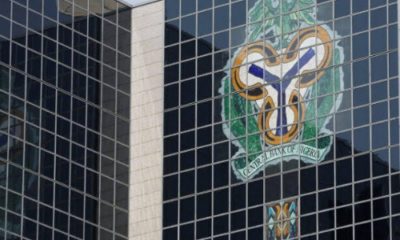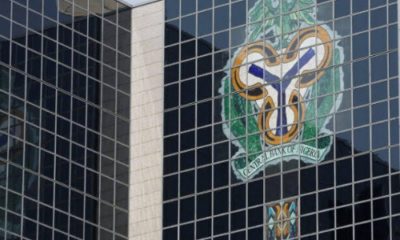Finance
PwC’s Forensic audit report on NNPC: Matters Arising

LAGOS-THE long-awaited report of the forensic audit of the Nigerian National Petroleum Corporation (NNPC) which the Federal Government hired PricewaterhouseCoopers (PwC) to conduct has finally been released.
As with almost everything in these political times, the forensic audit was elevated into a campaign issue when some politicians began to raise questions about why it was taking so long for the report to be released, insinuating that it may have been swept under the carpet by an administration they believe has a proclivity for supporting corruption. The release of the report has defused all such impressions imagined or real.
The idea of a forensic audit of NNPC was the brainchild of the Coordinating Minister of the Economy and Minister of Finance, Dr.Ngozi Okonjo-Iweala, who suggested during the Senate probe of the allegation of non-remittance of $49.8bn oil revenue into the Federation Account levied by the former Governor of the Central Bank of Nigeria (CBN), Mallam Sanusi Lamido Sanusi, against NNPC. Dr.Okonjo-Iweala had submitted before the Senate Committee on Finance that considering the level of interest and controversy that the allegation had generated it was good to have a forensic audit carried out on NNPC’s books to get to the bottom of the issue once and for all.
In order to understand the issues raised and the recommendations made in the PwC forensic audit report, it is pertinent to note that the starting point of the issues that led to the audit was the allegation of unremitted $49.8bn revenue from crude oil sales between January 2012 and 31 July 2013. Though the former CBN Governor (now Emir of Kano) who made the allegation had variously changed the figures of alleged unremitted revenue to $10.8 and $20bn, it must not be forgotten that he started the allegation with $49.8bn.
The summary of the forensic audit report which the Auditor General of the Federation, Mr. Samuel Ukura, presented to the public recently indicated that the allegation of unremitted $49.8bn, $10.8bn or $20bn was false. The report was emphatic that the total amount that accrued from crude oil lifting was $67bn out of which a total of $50.81bn was remitted into the Federation Account. The balance, the report stated, was used for petrol and kerosene subsidies and NNPC operations expenses.This position as reflected in the forensic audit report is consistent with the position that NNPC has always canvassed regarding the alleged “missing oil revenue”.
The other issue thrown up in the forensic audit report is the $1.48bn which the audit firm recommends that NNPC should pay into the Federation Account. This is where there has been so much misunderstanding which led to the various screaming headlines that the report indicted NNPC. The $1.48bn, according to the report, is “unremitted NPDC signature bonus due for divested assets and taxes/royalties”.
It needs to be stated that signature bonus, taxes and royalties on the divested assets were not part of the crude oil lifting revenue which the original allegation of “missing $49.8bn oil revenue” was about. Signature bonus is the book value of oil assets. It is usually determined by the Department of Petroleum Resources (DPR) based on certain parameters. What happened in the case of the divested oil blocks by Shell and which were assigned to the Nigerian Petroleum Development Company (NPDC), the Exploration and Production subsidiary of NNPC, was that DPR estimated the book value of the oil blocks to be $1.847bn.
NNPC raised concerns with the parameters used for computing the book value of the assets. While the issues were being reconciled with the DPR, NNPC went ahead to pay over $300m as a token to indicate its interest in acquiring the blocks pending when the issues it raised over the parameters used in calculating the signature bonus were resolved. This much was explained by the Group Managing Director of NNPC, Dr. Joseph Dawha, at a press conference recently.
The point in the above explanation is that the $1.48bn is distinct from the revenues from oil lifting between 1st January 2012 and July 2013 which the allegation of unremitted $49.8bn was all about. This distinction helps to highlight the error in the interpretation of the recommendation of the forensic audit report with regard to the remittance of the $1.48bn made in some quarters that NNPC was indicted in the report. The recommendation that NNPC/NPDC should remit the outstanding signature bonus to the Federation Account does not amount to indictment in anyway as the amount is not part of the original amount alleged to be missing or unremitted. And the fact that NNPC had already commenced payment of the signature bonus as indicated in the PwC forensic audit report shows that it actually had the intention to pay the money as soon as the concerns it raised over the parameters deployed in calculating the bonus were resolved. In any case, the Minister of Petroleum Resources, Mrs. Diezani Alison-Madueke, has directed NNPC to pay the outstanding $1.48bn forthwith.
The other issue which the report has thrown up has to do with the extant laws and business model which NNPC is constrained to run. The report recommends that the NNPC Act which “provisions contradict the requirement that NNPC be run as a commercially viable entity” must be reviewed as a matter of urgency. The report highlighted the fact that the issue of deduction of its operation costs and expenses from crude oil sales proceeds by NNPC for which the Corporation is pilloried daily is a legal issue made possible by the provisions of the NNPC Act which established the Corporation. The audit firm recognized and recommended that the way to go about correcting the anomaly is to review the legal framework and thereby the business model of the Corporation.
This once again underscores the need to urgently pass the Petroleum Industry Bill (PIB) which has been in the works in the National Assembly for upwards of five years. In fairness to NNPC, it has commenced a Transformation Programme aimed at retooling its structures and making it more commercially focused ahead of the post-PIB era. The duty of passing the Bill does not lie with the NNPC but with the National Assembly. It is in the interest of all Nigerians for the PIB to be passed expeditiously to free NNPC to run as a commercial entity as recommended in the PwC report.
Until the PIB is passed to provide a legal foundation for the reforms recommended in the PwC report the nation will not be completely rid of allegations of unremitted revenues, the type that led to the long inquisition that has been fortunately laid to rest with the forensic audit report conducted by PwC.
Mr. Baridon Leton, a human rights activist, wrote from Port-Harcourt, Rivers State.
Banking
CBN Denies Currency Devaluation

The Central Bank of Nigeria (CBN) has refuted claims of devaluing the.
Earlier reports suggested that the CBN had devalued the Naira, lowering its exchange rate from N631 to the dollar, compared to the previous day’s rate of N461.60 at the Importers and Exporters (I&E) window.
However, the Central Bank of Nigeria (CBN) released a statement on Thursday through its Acting Head of Corporate Communications, Dr. Isa Abdulmumin, categorizing the report as false information.
In the statement titled ‘CBN Has Not Devalued The Naira’, he said the attention of the apex bank was drawn to the news report by an Abuja based newspaper edition of June 1, 2023, titled “CB Devalues Naira To 630/51”.
However, the CBN stated categorically that the news report was replete with outright FALSEHOODS and destabilizing innuendos, ‘reflecting potentially willful ignorance of the said medium as to the workings of the Nigerian Foreign Exchange Market.’
“For the avoidance of doubt, the exchange rate at the Investors’ & Exporters (I&E) window traded this morning (June 1, 2023) at N465/USS1 and has been stable around this rate for a while.
“The public is hereby advised to ignore the news report by Daily Trust in its entirety, as it is speculative and calculated at causing panic in the market,” the CBN spokesman added.
He, therefore, advised media practitioners to verify their facts from the Central Bank of Nigeria before publishing in order not to misinform the public.
Banking
BREAKING: CBN Increases Interest Rate By 0.5%

The interest rate in Nigeria has been raised to 18.5 percent, up by 0.5 percent, from 18 percent where it was pegged in March 2023.
The Central Banks of Nigeria’s (CBN) Monetary Policy Committee (MPC) resolved to this effect at its third meeting of 2023 in Abuja, on Wednesday.
Governor, CBN, Godwin Emefiele, made the disclosure in the communiqué of the MPC’s meeting, thereafter.
While engaging the media at the end of the two-day meeting, Emefiele, said the committee voted to keep the asymmetric corridor at +100 and -700 basis points around the MPR.
In the view of the MPC, rising inflation rate is traceable to the high energy cost and challenges around the supply chain, among others, which lie outside the corridors of the CBN.
Emefiele said, “The current trend in price development would continue to be monitored by the bank with greater collaboration with fiscal authority to address the drivers of inflation.”
Biztellers reports that the CBN had effected six consecutive interest rate increases, which has seen the rate move from 11.5 percent in March 2022 to 18.5 percent in May 2023.
Finance
Dangers Lurk As Nigerians Resort To Refurbished Gas Cylinders

In Nigeria, people have been forced to come up with creative solutions to cope with the effects of inflation and the economic crisis.
These improvised strategies have not only helped individuals save money, but also enabled them to stay afloat during difficult times.
In a concerning development, the recent trend of boycotting the high cost of cooking gas cylinders in Nigeria may pose a greater risk to lives than it does in terms of saving money.
Economy&Lifestyle investigations have revealed that the soaring prices of gas cylinders have reached a point where it has become increasingly challenging for average households to afford them, let alone refill them with gas.
The situation is further exacerbated by the fact that the pump price of kerosene, which would typically serve as an alternative, has become prohibitively expensive.
Upon investigation, it was found that the prices of gas cylinders vary depending on their sizes. A 3kg gas cylinder is priced at N14,000, while a 5kg cylinder costs N16,000. The larger cylinders are even more costly, with a 6kg cylinder priced at N17,000 and a 12.5kg cylinder costing N19,000.
Additionally, the expense continues when it comes to filling these cylinders with cooking gas, as it costs N2,600 for a 3kg cylinder, N5,200 for a 6kg cylinder, N8,950 for a 10.5kg cylinder, and N10,650 for a 12.5kg cylinder.
Consequently, an average household that needs to replace a worn-out 5kg cylinder would have to come up with N20,250 to purchase a new cylinder and fill it with gas, which can be a difficult feat to achieve.
As a result, many people have resorted to refurbishing their old cylinders and trying to use them as best as they can. However, this approach poses a significant danger.
Mrs. Rukayat Adesoji, a trader, shared her experience regarding her gas cylinder, which had become rusted and could no longer stand upright since last month. Due to the exorbitant prices of purchasing new cylinders, she resorted to seeking the assistance of a welder.
The welder patched the legs of the cylinder, repainted it, and ever since then, she has been using the refurbished cylinder for her cooking needs.
She said ““My gas cylinder which was 6kg got rusted and no longer stands erect since last month. When I asked for the price, I was told it was N17, 500. I was discussing it with a friend who advised me to take it to a welder to paint it and construct a new stand. I heeded to her advice and at the end spent just N3, 000 to turn my cooking gas to a brand new.”
Apart from refurbishing cylinders, some people don’t even know when their cylinders will expire. Mrs. Mercy Opara, a hair stylist, falls in that category as she explained: “I am taking my gas cylinder to the welder to spray it for me. It just cost N1, 500.
“The cost of buying a new cylinder is high. I have been using my cylinder for over 7 years and I don’t even know the expiry date. I just pray God blesses me so that I can buy a new one. But this one I am managing will look neat after spraying it for another two years.”
Mr. Adekanbi Joseph, a wielder, said he paints cylinder and “To paint and rebuild a cylinder stand, I charge N4, 500. Many people come here to paint as a new cylinder is now very expensive to get.”
Highlighting the potential dangers of using refurbished cylinders, Mr. Benjamin Hope, the Chief Executive Officer of FKT Cooking gas and general goods, emphasized the risks involved.
He stated that even a brand new cylinder can pose a risk of explosion if the locks are not properly secured after use or if the cylinder filled with gas is moved from one location to another.
He said “A brand new cylinder can explode if the locks are not well keyed after using and if the cylinder filled with gas was moved from one place.
“There are many reasons for the high cost of gas cylinders in Nigeria. One is the cost of importation due to the exchange rate. Another is the increased migration from the use of kerosene to cooking gas which has necessitated increased demand for gas cylinders. You know that in such a case there will be increased importation of cylinders.”he added




















